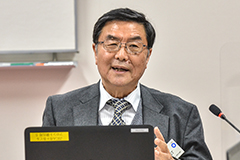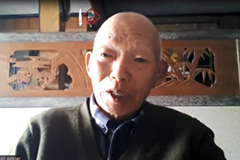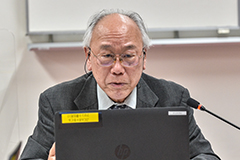Eleventh Knowledge Forum: What Is Needed to Make the African Green Revolution Happen?
2022.05.31
On March 22, 2022, JICA Ogata Sadako Research Institute for Peace and Development (JICA Ogata Research Institute) hosted the Eleventh Knowledge Forum “Diffusion of the Japanese Rice Farming Technologies to Asia and further to Africa” online.
Makino Koji, director general of JICA Ogata Research Institute, mentioned in his opening remarks that in 2008, JICA launched an international initiative called the Coalition for African Rice Development (CARD), aiming to double rice production in Africa in ten years. This goal was met in 2018, but compared to the Asian Green Revolution, the growth in rice production in Africa is slower. Makino then said that we need to develop discussion around what is important in order to make the African Green Revolution happen.
Next, Otsuka Keijiro, who is a professor at the Center for Social Systems Innovation, Kobe University, gave a keynote lecture. He explained that the Asian Green Revolution in rice was triggered following the transfer of Japanese rice production practices and technologies to Taiwan and Korea after World War I and from Taiwan and Japan to Southeast Asia in the 1960s. This enabled Asia to avoid a forecasted food crisis which was expected to be caused by population overshoot and drought. The Asian Green Revolution in rice refers to the series of development and diffusion of semi-dwarf rice varieties that are responsive to fertilizers and high yielding, beginning with the development of the so-called “miracle rice” in 1966. However, Otsuka pointed out that the fact that many people still believe to date that the Asian Green Revolution was the "seed-fertilizer revolution," may in fact be a major source of the problem in the context of Sub-Saharan Africa.

Otsuka Keijiro, professor at the Center for Social Systems Innovation, Kobe University, gave a keynote lecture
Otsuka urged the need of the African Green Revolution in rice. Africa is undergoing a population overshoot, but undeveloped land suitable for farming is scarce and growth in food production is sluggish, a third of the rice consumed on the continent is imported from Asia, and there could be a global shortage of rice because Asian rice production is likely to decline in the future. He also said that the African Green Revolution would be necessary to achieve the Sustainable Development Goals (SDGs) to end poverty and hunger. Otsuka then pointed out that rice grown in paddy fields looks promising in Africa as there still is plenty of unused wetland suitable for paddy rice cultivation and there is potential for Asian technologies to be transferred. However, he showed that there are many challenges as well: basic rice production techniques like transplanting seedlings in rows or making dikes between paddy fields are not thoroughly applied, mechanization is not showing much progress in Africa; and draft animal like water buffaloes, which played important roles during the Asian Green Revolution, are not available. Having said so, Otsuka noted that there are some positive changes. Some African countries are achieving a significant increase in rice yield, implying that the Green Revolution is just about to start. He also said that data collected by randomized controlled trials conducted in various African nations showed that even when trainings on rice production technologies were given only to selected farmers, the technologies spread to neighboring farmers and they showed improved rice yield as well. Otsuka emphasized that to realize the African Green Revolution in rice, the most important thing is to teach rice production technologies rather than to introduce improved varieties or chemical fertilizers. He added that this needs to be widely understood among policymakers in Africa and experts and academics in the field of development.
The keynote was followed by a talk session moderated by Fujiie Hitoshi, executive senior research fellow at JICA Ogata Research Institute. Kikuchi Masao, professor emeritus at Chiba University, and Tsuboi Tatsushi, senior rice technical adviser to JICA, participated as panelists. Tsuboi, who has worked for JICA as an expert on rice production in Asia and Africa for around 30 years, commented on the importance of rice production technologies. He said that there is a struggle to get appropriate technologies taking root in Africa because rice is not a main staple food and the priority for farmers is low. Unlike in Asia, where there is a long history of rice cultivation, in Africa, we have to teach farmers who are growing rice for the first time. Lowland rice cultivation requires a lot of time, effort and experience, as paddy fields must be prepared and seedlings must be grown before planting them in the fields. Based on his field experience, Tsuboi suggested that it might be better to start from upland rice, which requires easier tasks, to make the farmers understand the benefits of rice production and then move on to lowland rice which requires more time and effort.

Tsuboi Tatsushi, senior rice technical adviser to JICA, commented based on his field experience
Regarding how Otsuka mentioned the delay in irrigation infrastructure development in Africa, Kikuchi pointed out that while it is true that the Asian Green Revolution would have never happened without irrigation, we must learn from how there were many inappropriate investments then. He reflected that it must have been possible to create the same effect with smaller investments. Kikuchi indicated that since there is a lot of land suitable for rice production in Africa, development should be considered in a way that allows the flexible use of irrigation systems of varying scales.

Kikuchi Masao, professor emeritus at Chiba University, emphasized the need for flexible use of irrigation systems
In the Q&A session, the speakers responded to questions including those on how rice can coexist with other crops when available farmland per person is becoming smaller, and comments including those on the need to improve how rice is distributed in terms of food security. The forum was concluded with closing remarks from Amameishi Shinjiro, deputy director general of the Economic Development Department, JICA. Amameishi stated that we are still midway on the road to the African Green Revolution and JICA would like to continue to work hard in the field with African governments, academia and practitioners.

事業事前評価表(地球規模課題対応国際科学技術協力(SATREPS)).国際協力機構 地球環境部 . 防災第一チーム. 1.案件名.国 名: フィリピン共和国.

事業事前評価表(地球規模課題対応国際科学技術協力(SATREPS)).国際協力機構 地球環境部 . 防災第一チーム. 1.案件名.国 名: フィリピン共和国.

事業事前評価表(地球規模課題対応国際科学技術協力(SATREPS)).国際協力機構 地球環境部 . 防災第一チーム. 1.案件名.国 名: フィリピン共和国.

事業事前評価表(地球規模課題対応国際科学技術協力(SATREPS)).国際協力機構 地球環境部 . 防災第一チーム. 1.案件名.国 名: フィリピン共和国.

事業事前評価表(地球規模課題対応国際科学技術協力(SATREPS)).国際協力機構 地球環境部 . 防災第一チーム. 1.案件名.国 名: フィリピン共和国.
scroll